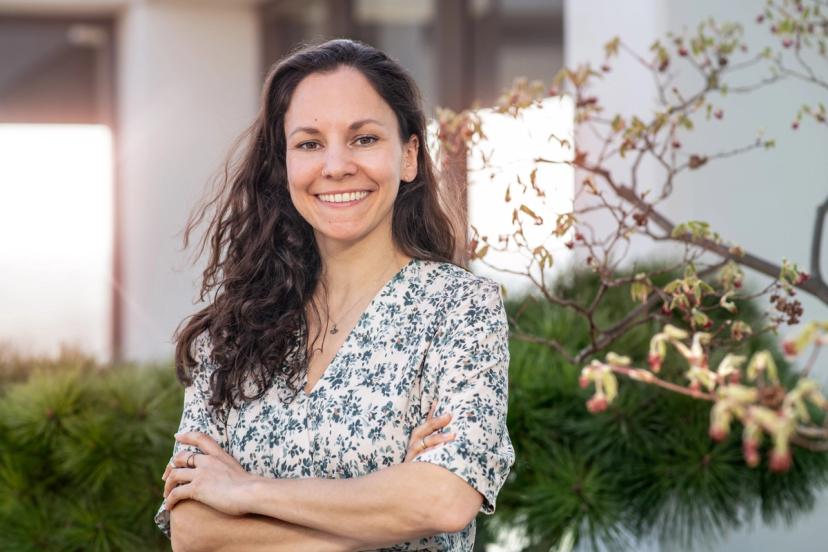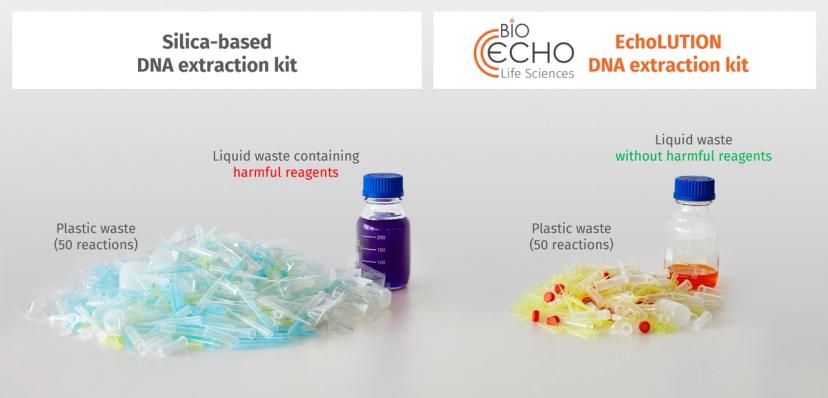Bringing sustainability to molecular diagnostics: A greener way to extract nucleic acids
Learn how the latest nucleic acid extraction technology aims to simplify molecular testing protocols while reducing consumable use, waste, and time to results
27 Jun 2022

Dr. Mona Al-Maarri, Product Manager and Sustainability Manager at BioEcho
The rapid and reliable extraction and purification of nucleic acids is critical for key downstream applications in life sciences, clinical diagnostics, forensics, and drug discovery research, but relies on techniques known to generate large amounts of plastic waste, high consumable use, and time-intensive protocols. This is a reality far too common across the science industry, but even as a growing number of scientists recognize the need to reduce the environmental impact of their benchwork, changes to established habits or workflows can be hard to implement. This is particularly true for molecular biology and diagnostics labs, where sterility, reproducibility, and standardization are of the utmost importance, and many remain skeptical over the ability of greener alternatives to replicate these requirements.
Keen to challenge this notion is Dr. Mona Al-Maarri, Product Manager and Sustainability Manager at BioEcho. “Established methods in molecular biology and diagnostics should be questioned for better alternatives,” she says. “Even small changes can have a myriad of benefits – and not only for the environment. Switching to greener products can streamline protocols, improve quality and safety, and save time and money,” she adds.
Headquartered in Cologne, Germany, BioEcho has been at the forefront of driving this shift in thinking since its foundation in 2016, with sustainability, environmental compatibility, and user health at the heart of its mission to develop innovative products that drastically improve the quality, convenience, and speed of standard molecular biology protocols. Nucleic acid extraction is just one area of the company with more to come in the future.
A new standard for nucleic acid extraction
For decades, the extraction and purification of nucleic acids has been dominated by silica-based methods that are characterized by tedious bind-wash-elute protocols, high plastic consumable use, and the handling of hazardous reagents such as chaotropic salts or organic solvents. As an alternative, BioEcho has developed EchoLUTION nucleic acid extraction kits based on proprietary EchoLUTION single-step purification technology that are designed to greatly reduce the number of working steps for the user and, consequently, the number of accessory consumables.
“Our EchoLUTION nucleic acid extraction kits are based on novel technology that works in a completely different way,” Mona explains. “This drastically simplifies the workflow, meaning fewer steps are needed and therefore, fewer reagents and consumables are required.”
Unlike common bind-wash-elute methods, EchoLUTION DNA kits do not include any inhibitory reagents and avoid harsh high-salt conditions and the use of ethanol. The protocol consists of a tailored sample lysis under aqueous conditions followed by single-step spin purification based on reverse purification holding back potential cell debris and contaminants.
As a result, all tedious steps of common silica-based procedures are omitted, enabling purification of nucleic acid samples about three times faster depending on the kit, with less handling and drastically reduced plastic consumable usage. “In total, using our kits result in about 70% less plastic waste compared to conventional silica-based kits,” Mona enthuses.

The plastic waste and liquid waste of an EchoLUTION DNA extraction kit (right) and a corresponding silica-based kit (left) were collected for comparison. 50 DNA extractions each were performed according to the supplier’s protocols. Using the BioEcho EchoLUTION kit results in up to 70% less plastic waste when compared with the silica-based bind-wash-elute kit (depending on the used kit). In addition, no toxic reagents are included in the BioEcho DNA extraction kits.
Minimizing the plastic that comes with the kit has also been carefully considered, with biodegradable alternatives being favored wherever possible. Plates and centrifugation tubes are filled in starch-based bags. In addition, reusable plastic components are not included in the kits themselves but can be purchased separately. “And to complete the reduce, reuse, recycle motto, our packaging materials are also based on recycled materials and can be easily recycled themselves,” she says. The kit boxes as well as the outer packaging is of FSC-certified cardboard with water-based colors. The company is constantly looking for sustainable alternatives without compromising the quality of their products.
In addition to offering a greener option for researchers, EchoLUTION kits can provide numerous benefits for lab safety and efficiency, while generating time- and cost-savings in the longer term. “Smaller boxes require less storage space, while fewer consumables mean less impact by supply shortages as well as reduced consumable costs,” Mona notes. “Faster workflows result in improved efficiency and lower labor-costs – and let’s not forget the reduced disposal costs by using less hazardous reagents.”
Going green without compromise
While many scientists are keen to reduce the impact of their research, it can often seem as if sustainability and benchwork quality are at odds with each other. “The top priority in molecular biology and diagnostic labs is to achieve reliable results and standardize workflows, so changing an established habit or workflow is therefore often viewed skeptically,” says Mona. However, for nucleic acid extraction, where yield and purity are of primary concern, EchoLUTION technology has been shown to outperform traditional silica kits. “Unlike conventional methods, with EchoLUTION, all impurities are held back by the purification matrix and the DNA and RNA pass through untouched,” she explains. This avoids unspecific binding of small unwanted DNA and RNA molecules, preventing the generation of misleading quantification reads, while providing highly purified DNA or RNA suitable for all downstream applications such as PCR, Genotyping and NGS applications. She continues, “We have kits for many different sample types, including viruses, blood, tissue or plants, and because we offer solutions for different throughputs, manual and automated workflows, and for research-use only as well as in vitro diagnostic use, they are suited for diagnostic laboratories, biopharmaceutical industries, as well as academic research.”
Where to start
Implementing eco-friendly alternatives into your lab or facility can be a daunting task, and Mona concludes by offering the following advice to other researchers looking to embrace greener practices, “I don’t believe that there will be a single innovation that leads to sustainable labs. It’s more about raising awareness, being honest and transparent about your efforts, and also where your limitations are. The most important thing is to start. Begin somewhere and you will soon realize that the changes you implement will become habits. You might have experienced that outside of work, where sustainability approaches are much more common – after implementation, there is no effort at all to keep it running.”
“Finally, for me personally, the most motivating thing is to find people that think the same way. That’s why we joined the My Green Lab community, and I can recommend them to everyone, because they offer a lot of different resources and bring you in contact with other green-thinking scientists.”
